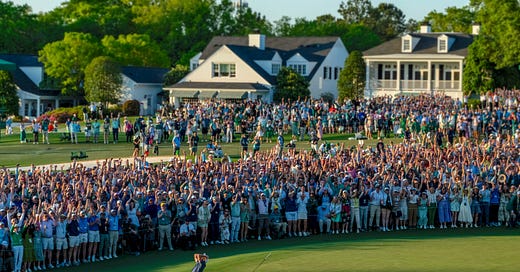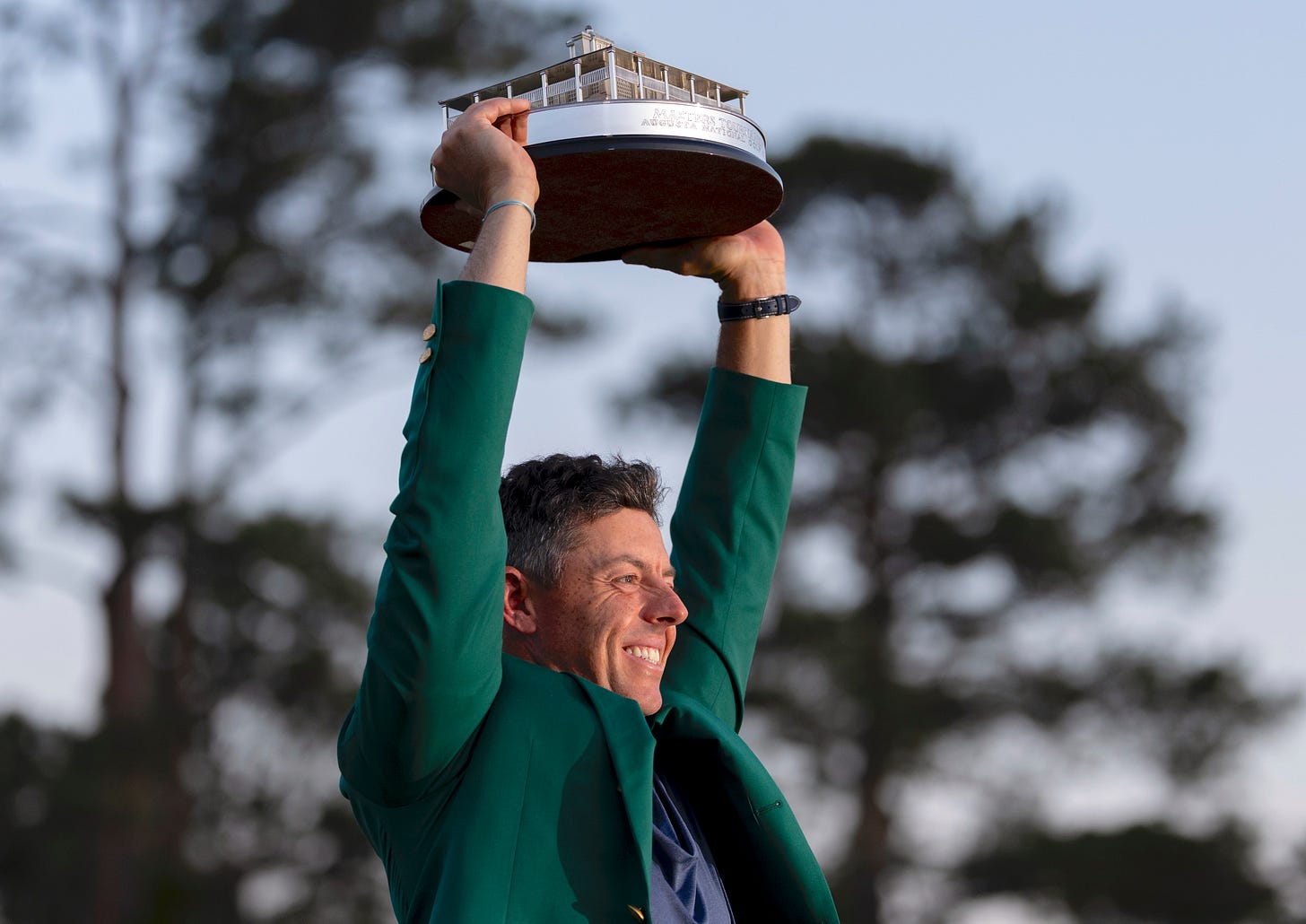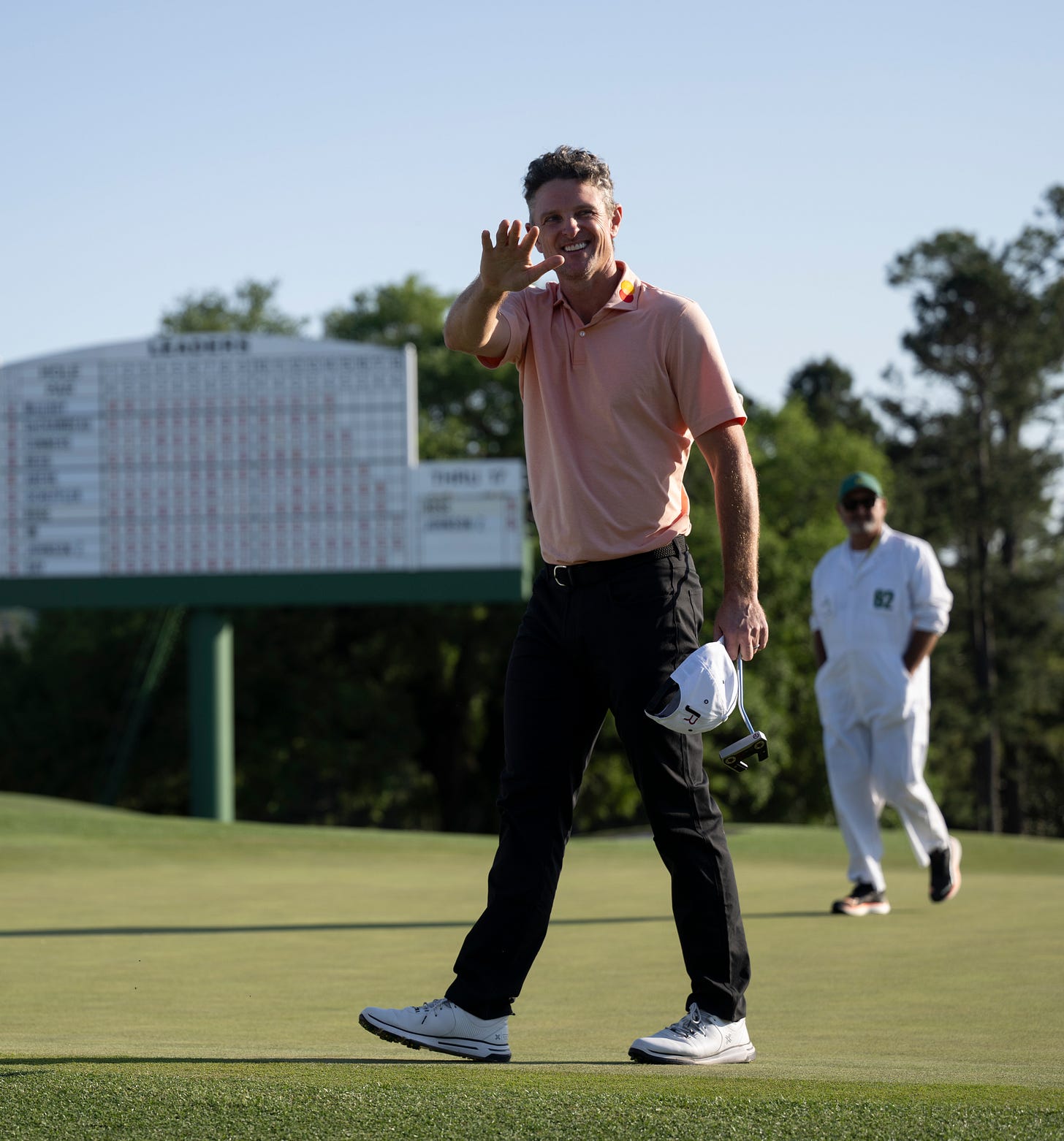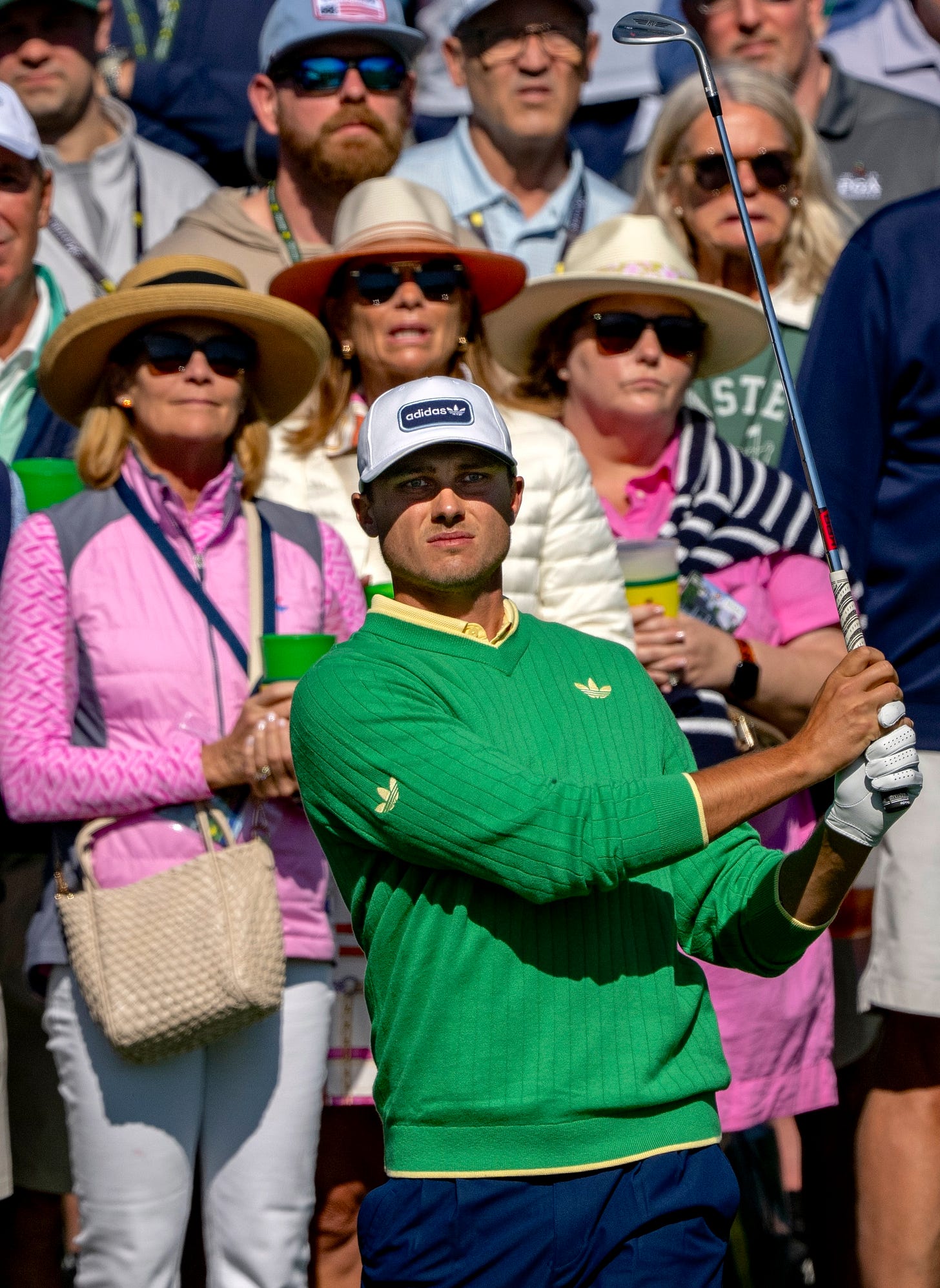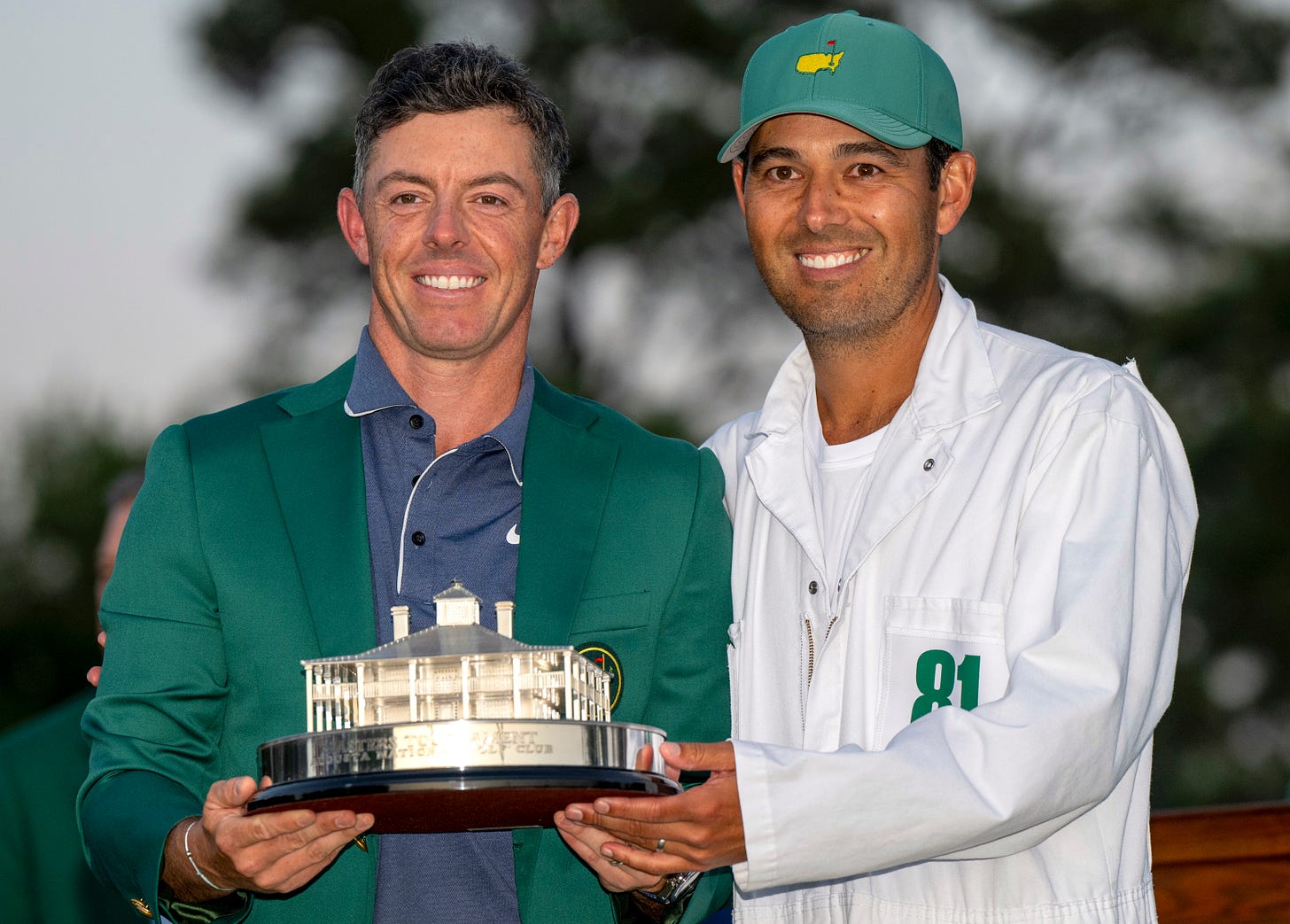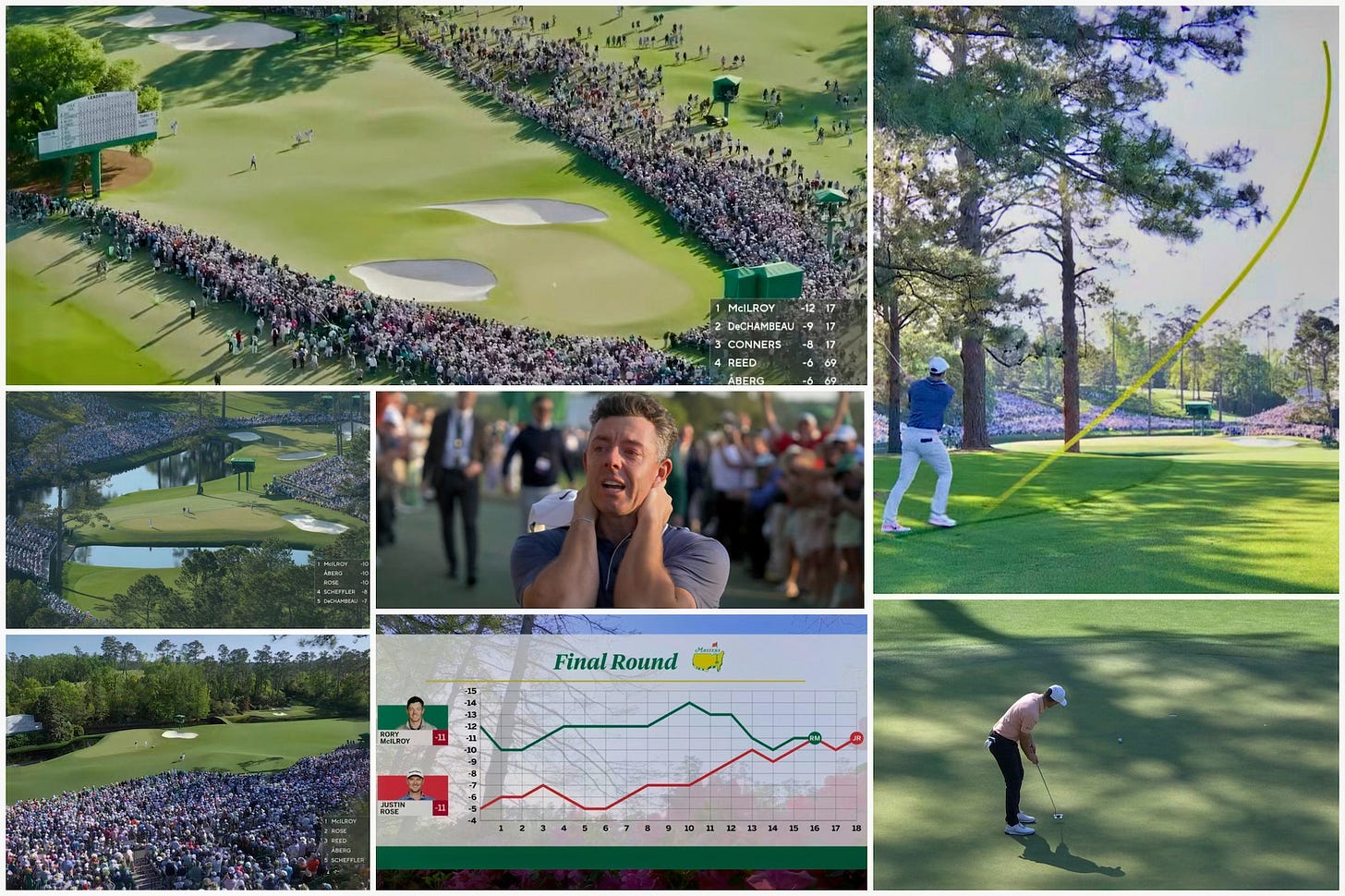Just some of the many winners from a week of triumphs…
Rory McIlroy. Golf fans close to it all will eventually be able to call this one the most satisfying weeks of our viewing lifetimes—once our digestive tracts unwind. For the millions of casual fans who tuned in after tuning out golf in recent years, McIlroy’s performance had a transcendent air about it that has made the world gain a newfound appreciation for our weird little sport. History will consider McIlroy’s effort last week to be one of the greatest ever in a sport filled with beauties. That’s thanks to the immense pressure he put on himself and the way he approaches the game. To win there after 17 starts (second most) and with so many factors having worked against him in recent majors, core golf fans understand the magnitude of the accomplishment. McIlroy could have said “here we go again” about 15 times last week. Yet he persevered to produce a win that comes with so much more than the usual Green Jacket: the first career Grand Slam by a European golfer and, essentially, the first clinched on the biggest stage of all in Augusta (no offense Gene Sarazen). McIlroy’s power and putting were brilliant for three days before the approach play ultimately carried him through (SG: 1st). The last three winners ranked first in strokes-gained: Tee-to-Green and outside the top 20 in SG putting (Rory was 43rd despite making a lot of key six-footers). He pulled off this win despite hitting just 47 of 72 greens and recording a seemingly-fatal number of three-putts for a Masters winner (three). And then there were the four double bogeys. Just one of those numbers would have destroyed lesser immortals. He also experienced weird bouts of impatience on several key putts. Throw in the persistence of Justin Rose and it all speaks to what we’ve known for a few years now: McIlroy’s game is better than as it’s ever been and as complete as anyone who has ever played the game. He has a month to enjoy a trip home, the celebratory Nike ad, the fun of wearing the Green Jacket everywhere, and even imagining the look on Nick Faldo’s face when the King fast-tracks knighthood. But he must regroup quickly McIlroy has a reasonable shot at achieving an otherworldly possibility: winning all four majors in 2025.
Justin Rose. A second straight major finishing second hurts, losing in a second Masters playoff is positively cruel. This did not stop him from once again demonstrating pure class in the aftermath. Even better, this time his 20-percenter was not giving the green coats a wrap-it-up signal to cut short another dignified stiff-upper-lip assessment of the week. One that included making 10 birdies Sunday, one short of the record for any Masters round. Rose joins Tom Weiskopf (4), Johnny Miller (3) Tom Kite (3) and Greg Norman in Hall of Fame company to come so close on multiple occasions. Rose also nearly tied the largest 54-hole comeback in Masters history when starting the final round seven strokes back. It’s not out of the question that he can still add another major with such an incredible attitude. “There's no point in being too despondent about it and you look at all the good stuff that got me into this situation,” Rose said. “You can't skip through a career without a little bit of heartache. It's not going to happen. If you're willing to lift the big championships, you've to put yourself on the line. You have to risk feeling this way to get the reverse. It's all -- it nets out.”
Bryson DeChambeau. A remarkable performance given what appeared to be his (at best) B-game. Birdieing three of the last four holes Saturday appeared to put a damper on McIlroy’s mood and added even more tension on Sunday. While DeChambeau ended up four strokes from the playoff, the week shows more deep Masters runs are in his future. He should ignore the haters seizing on his open, perhaps silly answers to questions. Majors would be far less interesting without DeChambeau around.
Ludvig Aberg. Two Masters, two incredible performances. The elegant Swede briefly tied for the lead through 16 holes before a three-putt at 17 and 18th hole triple bogey. In the logoclad overkill world of professional golf, last week’s bright outfits stood out against his peers sporting a drab array of cow pasture beige, Chernobyl gray, and hyperion treatment plant blues. The 25-year-old leaned into a lively Adidas revival, and his willingness to celebrate Masters springtime sure classed up the joint. A future Masters win also seems inevitable.
Harry Diamond. The endlessly-badgered bagman bought at least two weeks of criticism for not stopping his man from playing a shot. McIlroy’s faith in his looping pal paid off when we found out Diamond’s reassuring post-18th hole bogey words gave his player the boost needed to birdie the hole in sudden-death. And we learned he was not wild about an insane recovery play on the seventh that would have been a disaster. One quibble: next time your man pitches one from behind the 15th hole into the pond, you must tackle him when he’s walking back to the drop area and bringing a 10 into play.
Ratings. CBS averaged 12.7 million for Sunday’s final round and the audience peaked at a whopping 19.543 million viewers from 7-7:15 p.m. ET. Streaming numbers were not disclosed but added to the huge numbers. Sunday’s average audience size was up a stunning 33% from last year. Sky Sports says Sunday was its most-watched day in network history, with 7.5 million tuning in and 1.85 million watching after midnight when McIlroy and Rose played the 18th hole. To put the peak 19.5 million number in perspective, SBJ’s Josh Carpenter noted that it was only “700K less than the 20.2 million average for Tiger's win in 1997.” The numbers are especially remarkable given the well-documented decline in linear television reach.
CBS. The record pollen levels did not stop Jim Nantz from guiding the team who are—weirdly—in different announce locations. They were working an extra two hours this year on what is already a break-light, tense, just-don’t-call-it-a-mob-scene, broadcast. The variety of announcer locations was rarely noticeable, even with Frank Nobilo covering the 16th from the 11th where his view of Amen Corner takes priority, Ian Baker Finch from a super tower position, and Andrew Catalon above the 14th green. No one talked over each other and they all offered sparse but smart commentary regarding play on multiple holes, highlighted by moments like Baker-Finch noting how no one was getting up and down on No. 4 from where DeChambeau had hit his tee shot. Dottie Pepper was more indispensable than ever and added key observations about wind, shot choices, and things said inside the ropes. She shined best during Sunday’s 7th hole sequence when McIlroy pulled off an insane shot from the left second cut. Another set of eyes on the ground is desperately needed for shootout years like this one. Rose’s 66 lacked an (American) television voice during his epic comeback. And Sky’s on-course reporter is weirdly relegated to outside-the-rope status. What parts I heard from Sky’s announce team left a lot to be desired, particularly when Nick Faldo couldn’t resist talking about himself way too much.

